Toddler and Pre-schooler Observation: Jotting & Running Record - TAFE
VerifiedAdded on 2023/06/08
|9
|2710
|168
Practical Assignment
AI Summary
This assignment presents a practical application of child development observation techniques, specifically using jotting and running records. It includes a jotting on a toddler, Piper, focusing on emotional development during playdough activity, and a running record on a pre-schooler, Liam, observing social development during block play. The jotting record analyzes Piper's cognitive, physical, social, emotional, and language development, linking observations to theoretical perspectives like Piaget's cognitive development theory and Vygotsky's social learning theory. The running record captures Liam's interactions and skills, also connecting them to relevant theories. The assignment concludes by suggesting learning possibilities for future curriculum inclusion to enhance the children's skills and understanding. This document, contributed by a student, is available on Desklib, a platform offering a range of study tools and resources for students.
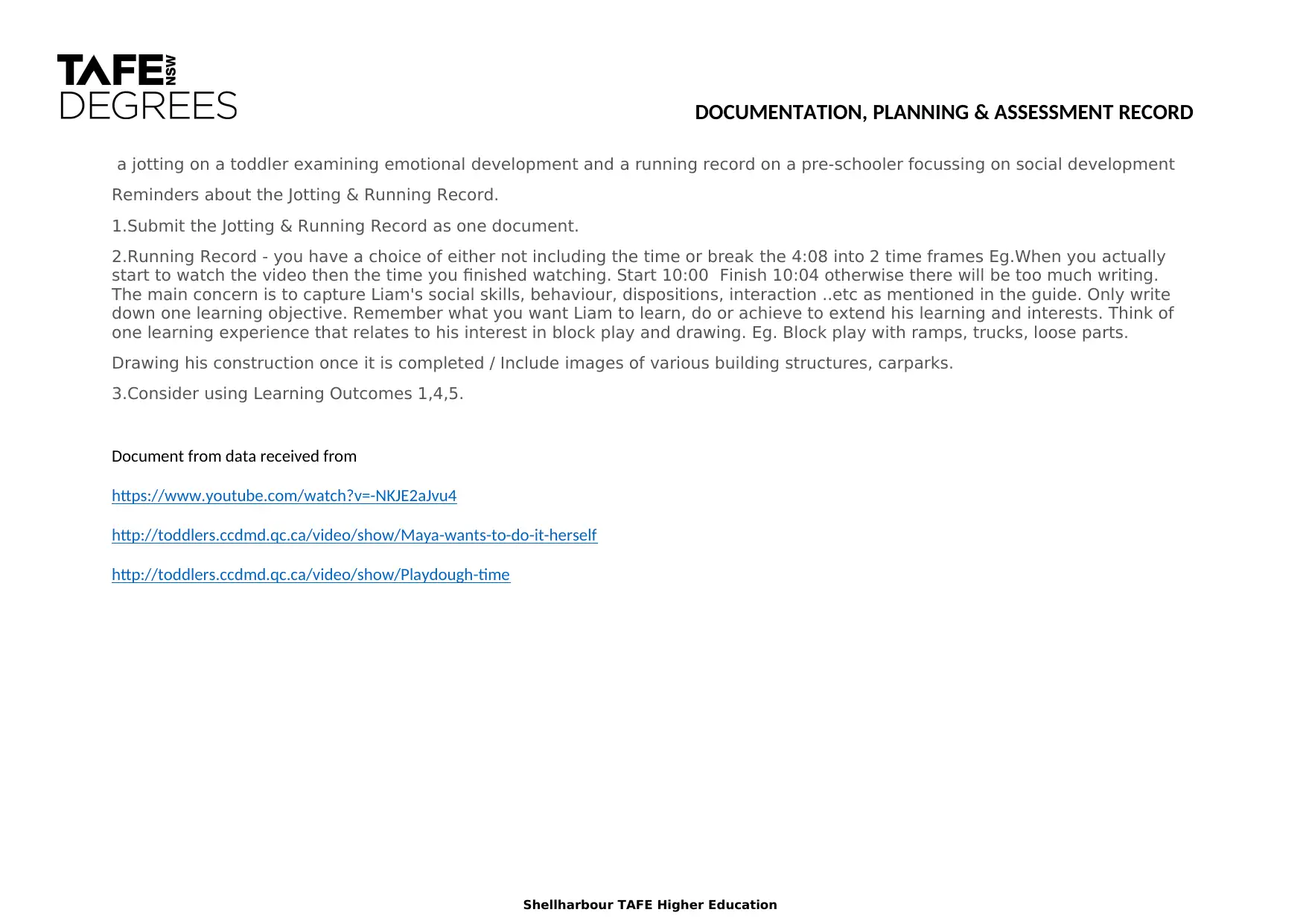
DOCUMENTATION, PLANNING & ASSESSMENT RECORD
a jotting on a toddler examining emotional development and a running record on a pre-schooler focussing on social development
Reminders about the Jotting & Running Record.
1.Submit the Jotting & Running Record as one document.
2.Running Record - you have a choice of either not including the time or break the 4:08 into 2 time frames Eg.When you actually
start to watch the video then the time you finished watching. Start 10:00 Finish 10:04 otherwise there will be too much writing.
The main concern is to capture Liam's social skills, behaviour, dispositions, interaction ..etc as mentioned in the guide. Only write
down one learning objective. Remember what you want Liam to learn, do or achieve to extend his learning and interests. Think of
one learning experience that relates to his interest in block play and drawing. Eg. Block play with ramps, trucks, loose parts.
Drawing his construction once it is completed / Include images of various building structures, carparks.
3.Consider using Learning Outcomes 1,4,5.
Document from data received from
https://www.youtube.com/watch?v=-NKJE2aJvu4
http://toddlers.ccdmd.qc.ca/video/show/Maya-wants-to-do-it-herself
http://toddlers.ccdmd.qc.ca/video/show/Playdough-time
Shellharbour TAFE Higher Education
a jotting on a toddler examining emotional development and a running record on a pre-schooler focussing on social development
Reminders about the Jotting & Running Record.
1.Submit the Jotting & Running Record as one document.
2.Running Record - you have a choice of either not including the time or break the 4:08 into 2 time frames Eg.When you actually
start to watch the video then the time you finished watching. Start 10:00 Finish 10:04 otherwise there will be too much writing.
The main concern is to capture Liam's social skills, behaviour, dispositions, interaction ..etc as mentioned in the guide. Only write
down one learning objective. Remember what you want Liam to learn, do or achieve to extend his learning and interests. Think of
one learning experience that relates to his interest in block play and drawing. Eg. Block play with ramps, trucks, loose parts.
Drawing his construction once it is completed / Include images of various building structures, carparks.
3.Consider using Learning Outcomes 1,4,5.
Document from data received from
https://www.youtube.com/watch?v=-NKJE2aJvu4
http://toddlers.ccdmd.qc.ca/video/show/Maya-wants-to-do-it-herself
http://toddlers.ccdmd.qc.ca/video/show/Playdough-time
Shellharbour TAFE Higher Education
Paraphrase This Document
Need a fresh take? Get an instant paraphrase of this document with our AI Paraphraser
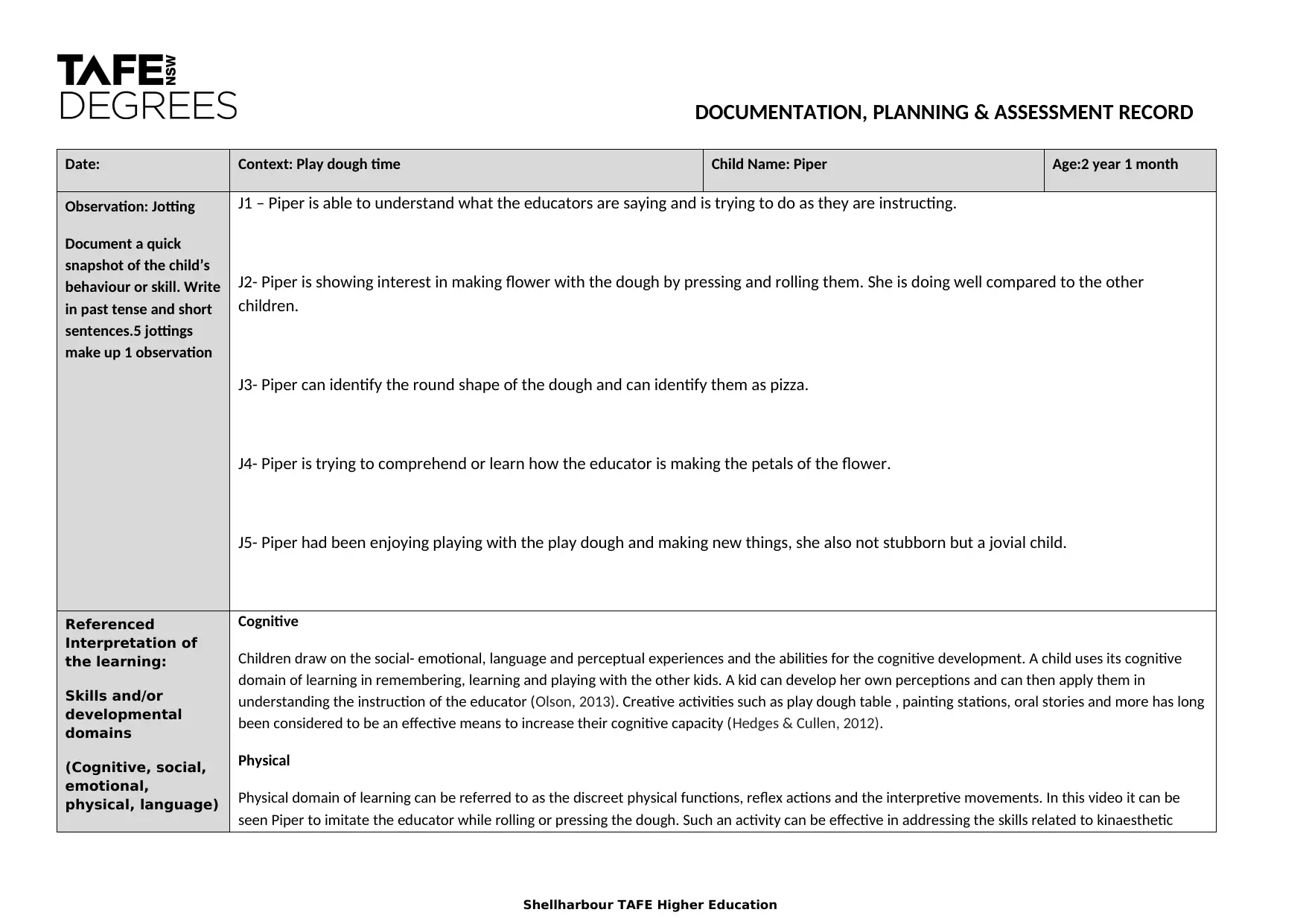
DOCUMENTATION, PLANNING & ASSESSMENT RECORD
Date: Context: Play dough time Child Name: Piper Age:2 year 1 month
Observation: Jotting
Document a quick
snapshot of the child’s
behaviour or skill. Write
in past tense and short
sentences.5 jottings
make up 1 observation
J1 – Piper is able to understand what the educators are saying and is trying to do as they are instructing.
J2- Piper is showing interest in making flower with the dough by pressing and rolling them. She is doing well compared to the other
children.
J3- Piper can identify the round shape of the dough and can identify them as pizza.
J4- Piper is trying to comprehend or learn how the educator is making the petals of the flower.
J5- Piper had been enjoying playing with the play dough and making new things, she also not stubborn but a jovial child.
Referenced
Interpretation of
the learning:
Skills and/or
developmental
domains
(Cognitive, social,
emotional,
physical, language)
Cognitive
Children draw on the social- emotional, language and perceptual experiences and the abilities for the cognitive development. A child uses its cognitive
domain of learning in remembering, learning and playing with the other kids. A kid can develop her own perceptions and can then apply them in
understanding the instruction of the educator (Olson, 2013). Creative activities such as play dough table , painting stations, oral stories and more has long
been considered to be an effective means to increase their cognitive capacity (Hedges & Cullen, 2012).
Physical
Physical domain of learning can be referred to as the discreet physical functions, reflex actions and the interpretive movements. In this video it can be
seen Piper to imitate the educator while rolling or pressing the dough. Such an activity can be effective in addressing the skills related to kinaesthetic
Shellharbour TAFE Higher Education
Date: Context: Play dough time Child Name: Piper Age:2 year 1 month
Observation: Jotting
Document a quick
snapshot of the child’s
behaviour or skill. Write
in past tense and short
sentences.5 jottings
make up 1 observation
J1 – Piper is able to understand what the educators are saying and is trying to do as they are instructing.
J2- Piper is showing interest in making flower with the dough by pressing and rolling them. She is doing well compared to the other
children.
J3- Piper can identify the round shape of the dough and can identify them as pizza.
J4- Piper is trying to comprehend or learn how the educator is making the petals of the flower.
J5- Piper had been enjoying playing with the play dough and making new things, she also not stubborn but a jovial child.
Referenced
Interpretation of
the learning:
Skills and/or
developmental
domains
(Cognitive, social,
emotional,
physical, language)
Cognitive
Children draw on the social- emotional, language and perceptual experiences and the abilities for the cognitive development. A child uses its cognitive
domain of learning in remembering, learning and playing with the other kids. A kid can develop her own perceptions and can then apply them in
understanding the instruction of the educator (Olson, 2013). Creative activities such as play dough table , painting stations, oral stories and more has long
been considered to be an effective means to increase their cognitive capacity (Hedges & Cullen, 2012).
Physical
Physical domain of learning can be referred to as the discreet physical functions, reflex actions and the interpretive movements. In this video it can be
seen Piper to imitate the educator while rolling or pressing the dough. Such an activity can be effective in addressing the skills related to kinaesthetic
Shellharbour TAFE Higher Education
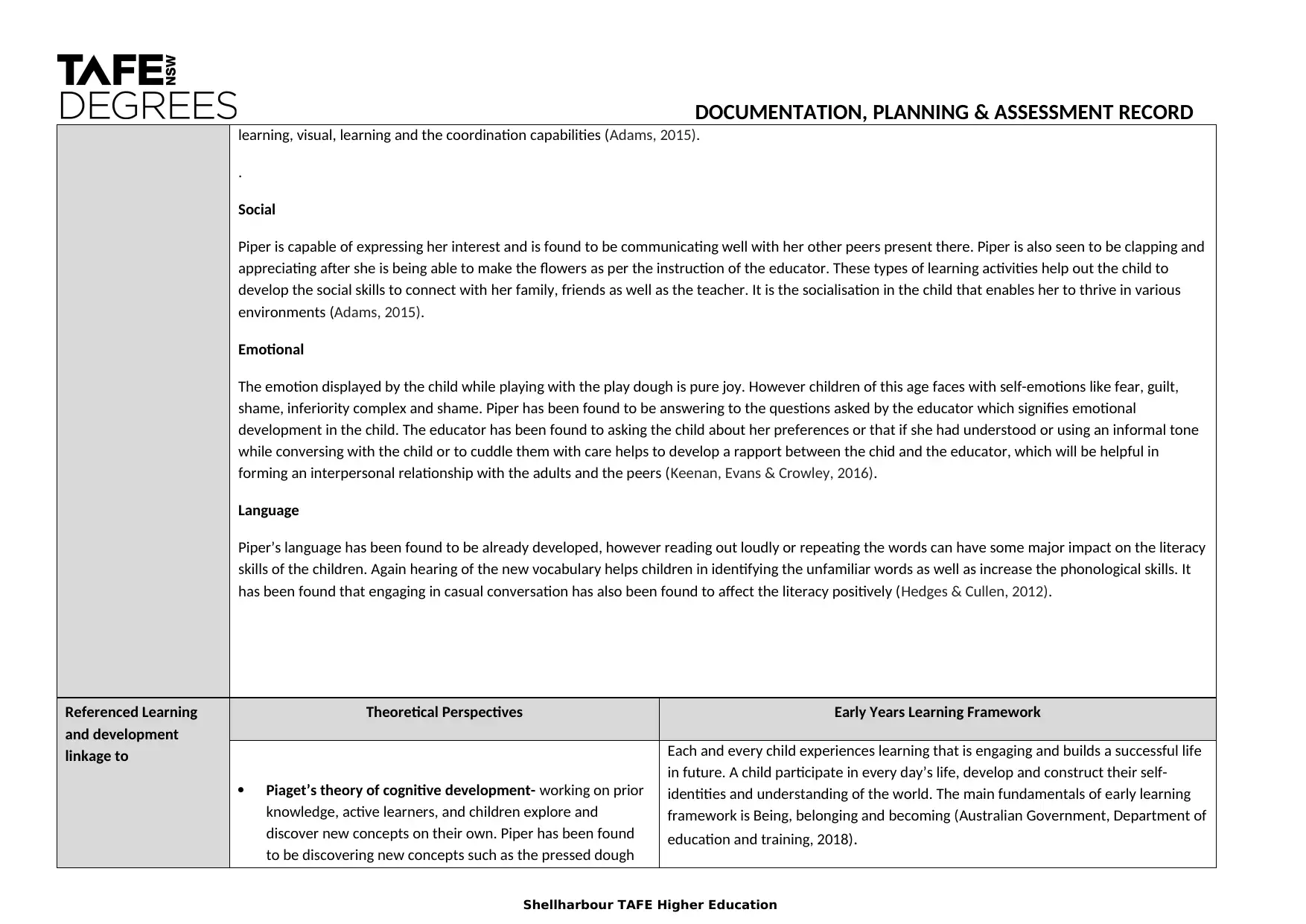
DOCUMENTATION, PLANNING & ASSESSMENT RECORD
learning, visual, learning and the coordination capabilities (Adams, 2015).
.
Social
Piper is capable of expressing her interest and is found to be communicating well with her other peers present there. Piper is also seen to be clapping and
appreciating after she is being able to make the flowers as per the instruction of the educator. These types of learning activities help out the child to
develop the social skills to connect with her family, friends as well as the teacher. It is the socialisation in the child that enables her to thrive in various
environments (Adams, 2015).
Emotional
The emotion displayed by the child while playing with the play dough is pure joy. However children of this age faces with self-emotions like fear, guilt,
shame, inferiority complex and shame. Piper has been found to be answering to the questions asked by the educator which signifies emotional
development in the child. The educator has been found to asking the child about her preferences or that if she had understood or using an informal tone
while conversing with the child or to cuddle them with care helps to develop a rapport between the chid and the educator, which will be helpful in
forming an interpersonal relationship with the adults and the peers (Keenan, Evans & Crowley, 2016).
Language
Piper’s language has been found to be already developed, however reading out loudly or repeating the words can have some major impact on the literacy
skills of the children. Again hearing of the new vocabulary helps children in identifying the unfamiliar words as well as increase the phonological skills. It
has been found that engaging in casual conversation has also been found to affect the literacy positively (Hedges & Cullen, 2012).
Referenced Learning
and development
linkage to
Theoretical Perspectives Early Years Learning Framework
Piaget’s theory of cognitive development- working on prior
knowledge, active learners, and children explore and
discover new concepts on their own. Piper has been found
to be discovering new concepts such as the pressed dough
Each and every child experiences learning that is engaging and builds a successful life
in future. A child participate in every day’s life, develop and construct their self-
identities and understanding of the world. The main fundamentals of early learning
framework is Being, belonging and becoming (Australian Government, Department of
education and training, 2018).
Shellharbour TAFE Higher Education
learning, visual, learning and the coordination capabilities (Adams, 2015).
.
Social
Piper is capable of expressing her interest and is found to be communicating well with her other peers present there. Piper is also seen to be clapping and
appreciating after she is being able to make the flowers as per the instruction of the educator. These types of learning activities help out the child to
develop the social skills to connect with her family, friends as well as the teacher. It is the socialisation in the child that enables her to thrive in various
environments (Adams, 2015).
Emotional
The emotion displayed by the child while playing with the play dough is pure joy. However children of this age faces with self-emotions like fear, guilt,
shame, inferiority complex and shame. Piper has been found to be answering to the questions asked by the educator which signifies emotional
development in the child. The educator has been found to asking the child about her preferences or that if she had understood or using an informal tone
while conversing with the child or to cuddle them with care helps to develop a rapport between the chid and the educator, which will be helpful in
forming an interpersonal relationship with the adults and the peers (Keenan, Evans & Crowley, 2016).
Language
Piper’s language has been found to be already developed, however reading out loudly or repeating the words can have some major impact on the literacy
skills of the children. Again hearing of the new vocabulary helps children in identifying the unfamiliar words as well as increase the phonological skills. It
has been found that engaging in casual conversation has also been found to affect the literacy positively (Hedges & Cullen, 2012).
Referenced Learning
and development
linkage to
Theoretical Perspectives Early Years Learning Framework
Piaget’s theory of cognitive development- working on prior
knowledge, active learners, and children explore and
discover new concepts on their own. Piper has been found
to be discovering new concepts such as the pressed dough
Each and every child experiences learning that is engaging and builds a successful life
in future. A child participate in every day’s life, develop and construct their self-
identities and understanding of the world. The main fundamentals of early learning
framework is Being, belonging and becoming (Australian Government, Department of
education and training, 2018).
Shellharbour TAFE Higher Education
⊘ This is a preview!⊘
Do you want full access?
Subscribe today to unlock all pages.

Trusted by 1+ million students worldwide
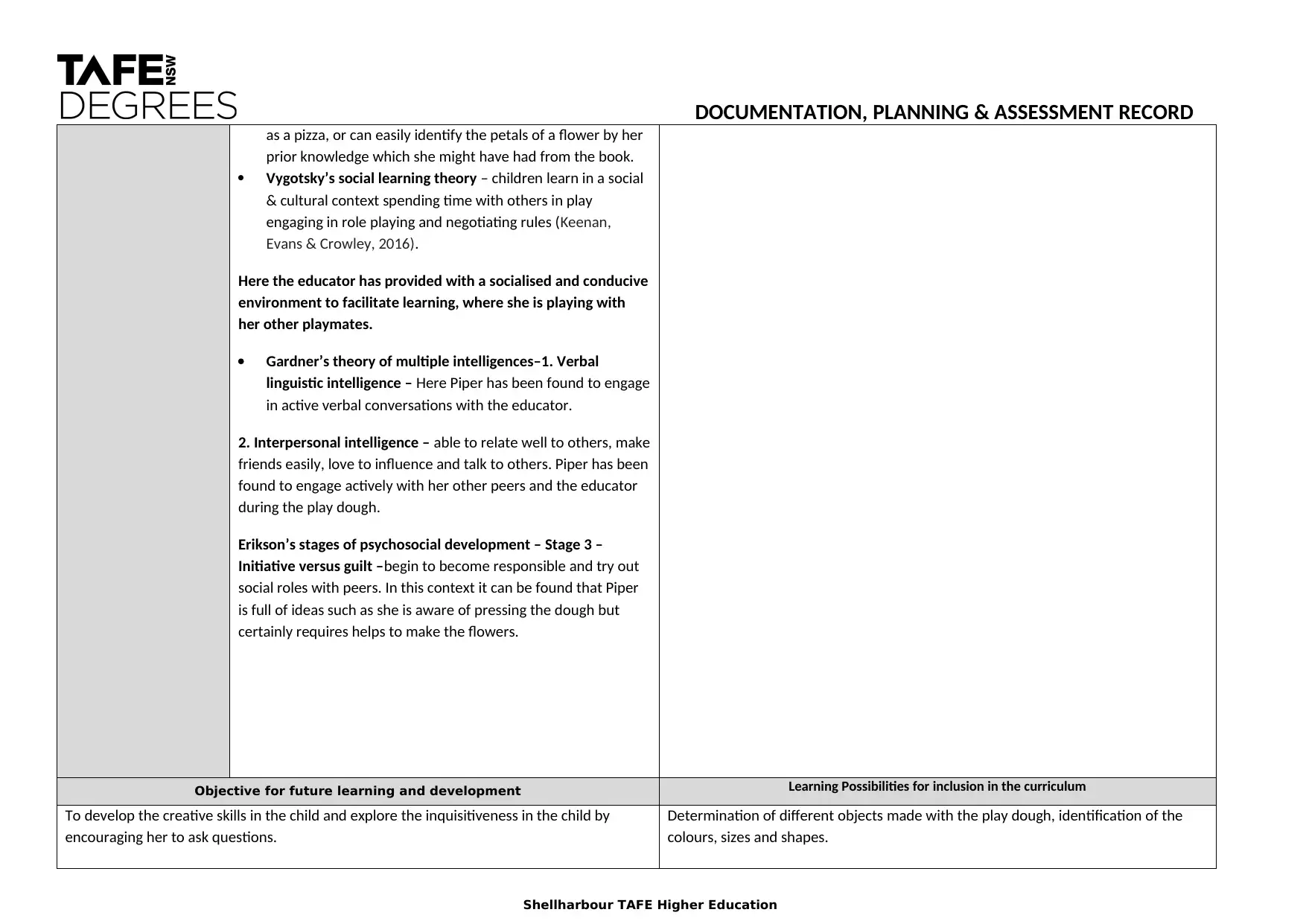
DOCUMENTATION, PLANNING & ASSESSMENT RECORD
as a pizza, or can easily identify the petals of a flower by her
prior knowledge which she might have had from the book.
Vygotsky’s social learning theory – children learn in a social
& cultural context spending time with others in play
engaging in role playing and negotiating rules (Keenan,
Evans & Crowley, 2016).
Here the educator has provided with a socialised and conducive
environment to facilitate learning, where she is playing with
her other playmates.
Gardner’s theory of multiple intelligences–1. Verbal
linguistic intelligence – Here Piper has been found to engage
in active verbal conversations with the educator.
2. Interpersonal intelligence – able to relate well to others, make
friends easily, love to influence and talk to others. Piper has been
found to engage actively with her other peers and the educator
during the play dough.
Erikson’s stages of psychosocial development – Stage 3 –
Initiative versus guilt –begin to become responsible and try out
social roles with peers. In this context it can be found that Piper
is full of ideas such as she is aware of pressing the dough but
certainly requires helps to make the flowers.
Objective for future learning and development Learning Possibilities for inclusion in the curriculum
To develop the creative skills in the child and explore the inquisitiveness in the child by
encouraging her to ask questions.
Determination of different objects made with the play dough, identification of the
colours, sizes and shapes.
Shellharbour TAFE Higher Education
as a pizza, or can easily identify the petals of a flower by her
prior knowledge which she might have had from the book.
Vygotsky’s social learning theory – children learn in a social
& cultural context spending time with others in play
engaging in role playing and negotiating rules (Keenan,
Evans & Crowley, 2016).
Here the educator has provided with a socialised and conducive
environment to facilitate learning, where she is playing with
her other playmates.
Gardner’s theory of multiple intelligences–1. Verbal
linguistic intelligence – Here Piper has been found to engage
in active verbal conversations with the educator.
2. Interpersonal intelligence – able to relate well to others, make
friends easily, love to influence and talk to others. Piper has been
found to engage actively with her other peers and the educator
during the play dough.
Erikson’s stages of psychosocial development – Stage 3 –
Initiative versus guilt –begin to become responsible and try out
social roles with peers. In this context it can be found that Piper
is full of ideas such as she is aware of pressing the dough but
certainly requires helps to make the flowers.
Objective for future learning and development Learning Possibilities for inclusion in the curriculum
To develop the creative skills in the child and explore the inquisitiveness in the child by
encouraging her to ask questions.
Determination of different objects made with the play dough, identification of the
colours, sizes and shapes.
Shellharbour TAFE Higher Education
Paraphrase This Document
Need a fresh take? Get an instant paraphrase of this document with our AI Paraphraser
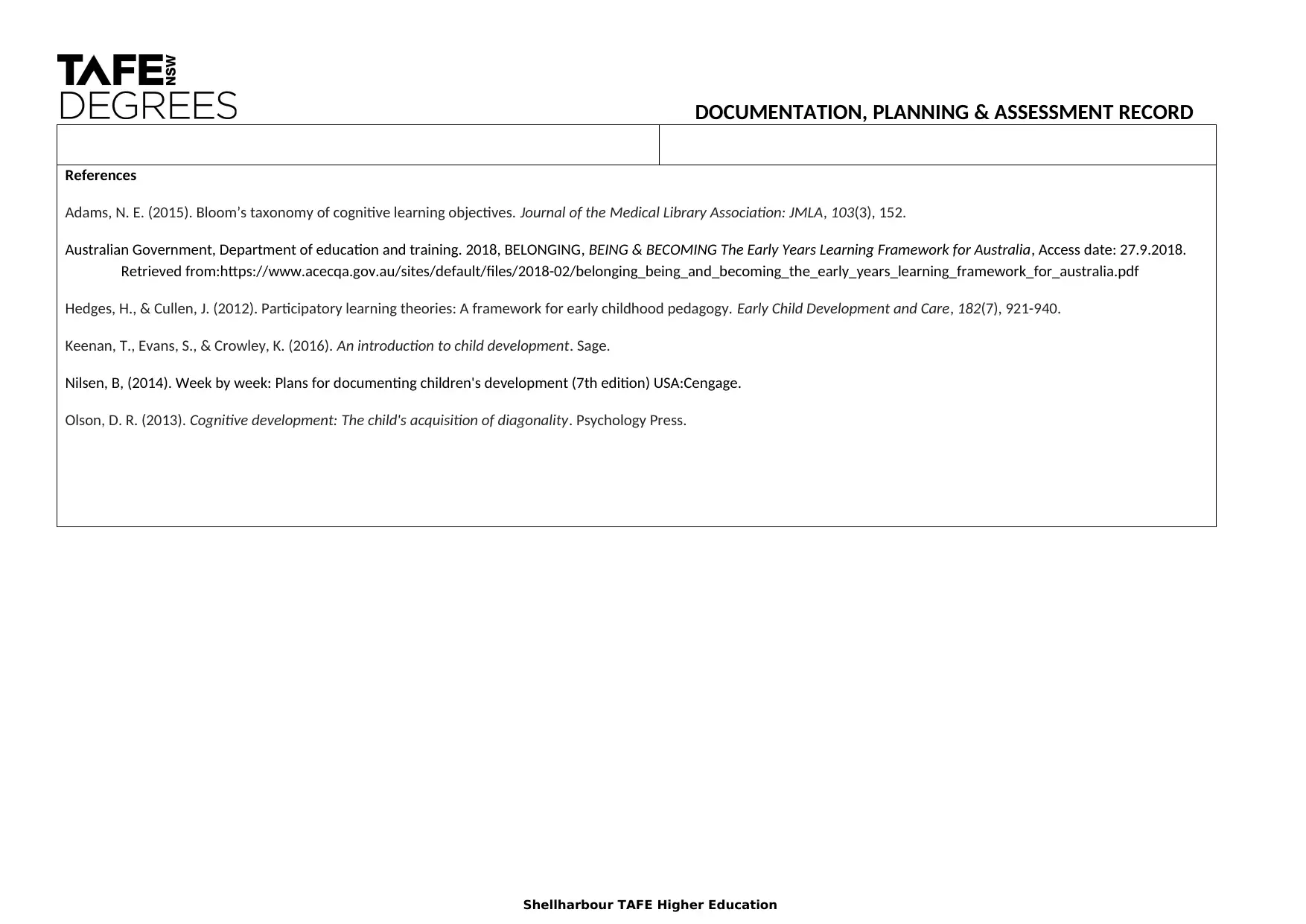
DOCUMENTATION, PLANNING & ASSESSMENT RECORD
References
Adams, N. E. (2015). Bloom’s taxonomy of cognitive learning objectives. Journal of the Medical Library Association: JMLA, 103(3), 152.
Australian Government, Department of education and training. 2018, BELONGING, BEING & BECOMING The Early Years Learning Framework for Australia, Access date: 27.9.2018.
Retrieved from:https://www.acecqa.gov.au/sites/default/files/2018-02/belonging_being_and_becoming_the_early_years_learning_framework_for_australia.pdf
Hedges, H., & Cullen, J. (2012). Participatory learning theories: A framework for early childhood pedagogy. Early Child Development and Care, 182(7), 921-940.
Keenan, T., Evans, S., & Crowley, K. (2016). An introduction to child development. Sage.
Nilsen, B, (2014). Week by week: Plans for documenting children's development (7th edition) USA:Cengage.
Olson, D. R. (2013). Cognitive development: The child's acquisition of diagonality. Psychology Press.
Shellharbour TAFE Higher Education
References
Adams, N. E. (2015). Bloom’s taxonomy of cognitive learning objectives. Journal of the Medical Library Association: JMLA, 103(3), 152.
Australian Government, Department of education and training. 2018, BELONGING, BEING & BECOMING The Early Years Learning Framework for Australia, Access date: 27.9.2018.
Retrieved from:https://www.acecqa.gov.au/sites/default/files/2018-02/belonging_being_and_becoming_the_early_years_learning_framework_for_australia.pdf
Hedges, H., & Cullen, J. (2012). Participatory learning theories: A framework for early childhood pedagogy. Early Child Development and Care, 182(7), 921-940.
Keenan, T., Evans, S., & Crowley, K. (2016). An introduction to child development. Sage.
Nilsen, B, (2014). Week by week: Plans for documenting children's development (7th edition) USA:Cengage.
Olson, D. R. (2013). Cognitive development: The child's acquisition of diagonality. Psychology Press.
Shellharbour TAFE Higher Education
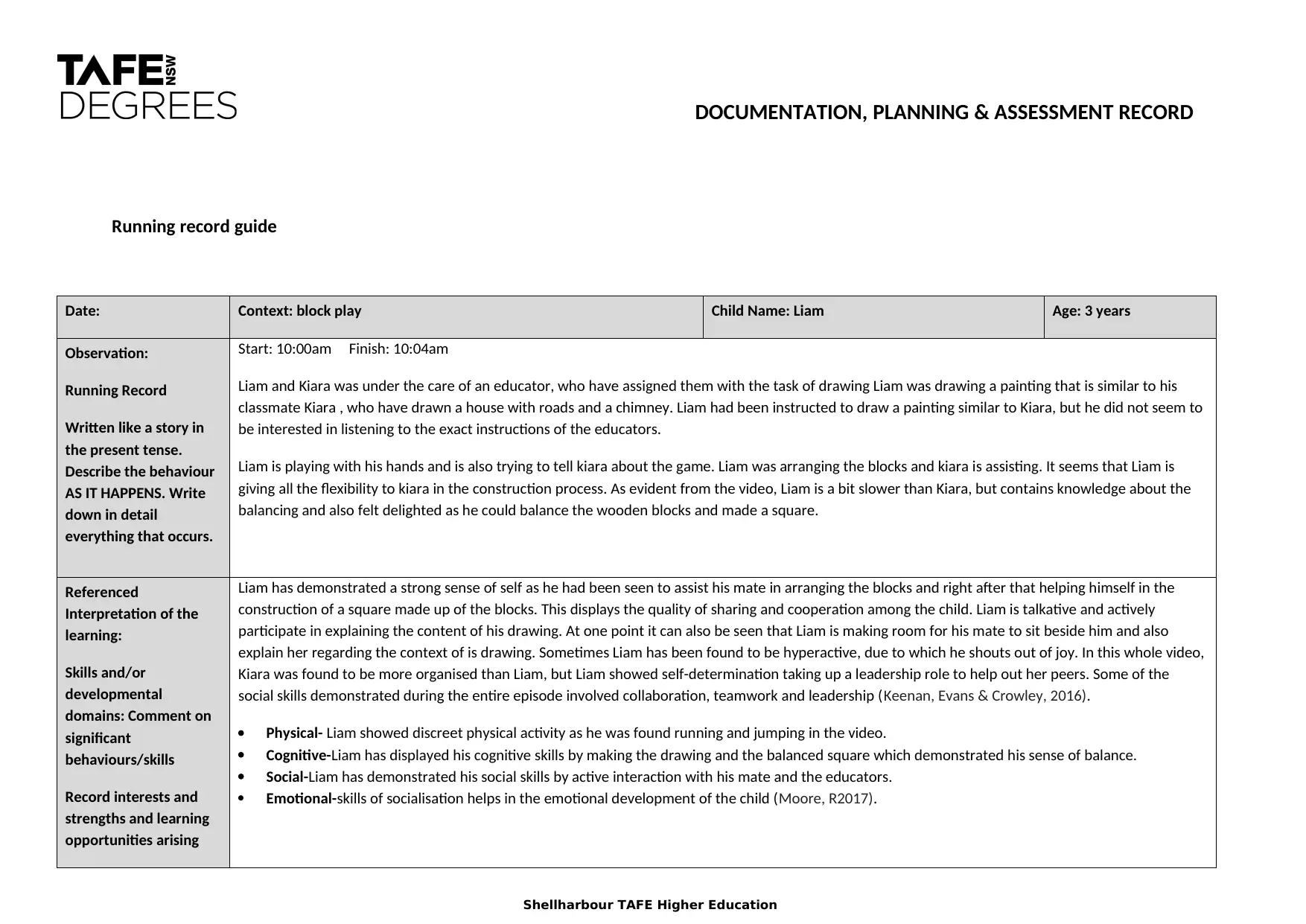
DOCUMENTATION, PLANNING & ASSESSMENT RECORD
Running record guide
Date: Context: block play Child Name: Liam Age: 3 years
Observation:
Running Record
Written like a story in
the present tense.
Describe the behaviour
AS IT HAPPENS. Write
down in detail
everything that occurs.
Start: 10:00am Finish: 10:04am
Liam and Kiara was under the care of an educator, who have assigned them with the task of drawing Liam was drawing a painting that is similar to his
classmate Kiara , who have drawn a house with roads and a chimney. Liam had been instructed to draw a painting similar to Kiara, but he did not seem to
be interested in listening to the exact instructions of the educators.
Liam is playing with his hands and is also trying to tell kiara about the game. Liam was arranging the blocks and kiara is assisting. It seems that Liam is
giving all the flexibility to kiara in the construction process. As evident from the video, Liam is a bit slower than Kiara, but contains knowledge about the
balancing and also felt delighted as he could balance the wooden blocks and made a square.
Referenced
Interpretation of the
learning:
Skills and/or
developmental
domains: Comment on
significant
behaviours/skills
Record interests and
strengths and learning
opportunities arising
Liam has demonstrated a strong sense of self as he had been seen to assist his mate in arranging the blocks and right after that helping himself in the
construction of a square made up of the blocks. This displays the quality of sharing and cooperation among the child. Liam is talkative and actively
participate in explaining the content of his drawing. At one point it can also be seen that Liam is making room for his mate to sit beside him and also
explain her regarding the context of is drawing. Sometimes Liam has been found to be hyperactive, due to which he shouts out of joy. In this whole video,
Kiara was found to be more organised than Liam, but Liam showed self-determination taking up a leadership role to help out her peers. Some of the
social skills demonstrated during the entire episode involved collaboration, teamwork and leadership (Keenan, Evans & Crowley, 2016).
Physical- Liam showed discreet physical activity as he was found running and jumping in the video.
Cognitive-Liam has displayed his cognitive skills by making the drawing and the balanced square which demonstrated his sense of balance.
Social-Liam has demonstrated his social skills by active interaction with his mate and the educators.
Emotional-skills of socialisation helps in the emotional development of the child (Moore, R2017).
Shellharbour TAFE Higher Education
Running record guide
Date: Context: block play Child Name: Liam Age: 3 years
Observation:
Running Record
Written like a story in
the present tense.
Describe the behaviour
AS IT HAPPENS. Write
down in detail
everything that occurs.
Start: 10:00am Finish: 10:04am
Liam and Kiara was under the care of an educator, who have assigned them with the task of drawing Liam was drawing a painting that is similar to his
classmate Kiara , who have drawn a house with roads and a chimney. Liam had been instructed to draw a painting similar to Kiara, but he did not seem to
be interested in listening to the exact instructions of the educators.
Liam is playing with his hands and is also trying to tell kiara about the game. Liam was arranging the blocks and kiara is assisting. It seems that Liam is
giving all the flexibility to kiara in the construction process. As evident from the video, Liam is a bit slower than Kiara, but contains knowledge about the
balancing and also felt delighted as he could balance the wooden blocks and made a square.
Referenced
Interpretation of the
learning:
Skills and/or
developmental
domains: Comment on
significant
behaviours/skills
Record interests and
strengths and learning
opportunities arising
Liam has demonstrated a strong sense of self as he had been seen to assist his mate in arranging the blocks and right after that helping himself in the
construction of a square made up of the blocks. This displays the quality of sharing and cooperation among the child. Liam is talkative and actively
participate in explaining the content of his drawing. At one point it can also be seen that Liam is making room for his mate to sit beside him and also
explain her regarding the context of is drawing. Sometimes Liam has been found to be hyperactive, due to which he shouts out of joy. In this whole video,
Kiara was found to be more organised than Liam, but Liam showed self-determination taking up a leadership role to help out her peers. Some of the
social skills demonstrated during the entire episode involved collaboration, teamwork and leadership (Keenan, Evans & Crowley, 2016).
Physical- Liam showed discreet physical activity as he was found running and jumping in the video.
Cognitive-Liam has displayed his cognitive skills by making the drawing and the balanced square which demonstrated his sense of balance.
Social-Liam has demonstrated his social skills by active interaction with his mate and the educators.
Emotional-skills of socialisation helps in the emotional development of the child (Moore, R2017).
Shellharbour TAFE Higher Education
⊘ This is a preview!⊘
Do you want full access?
Subscribe today to unlock all pages.

Trusted by 1+ million students worldwide
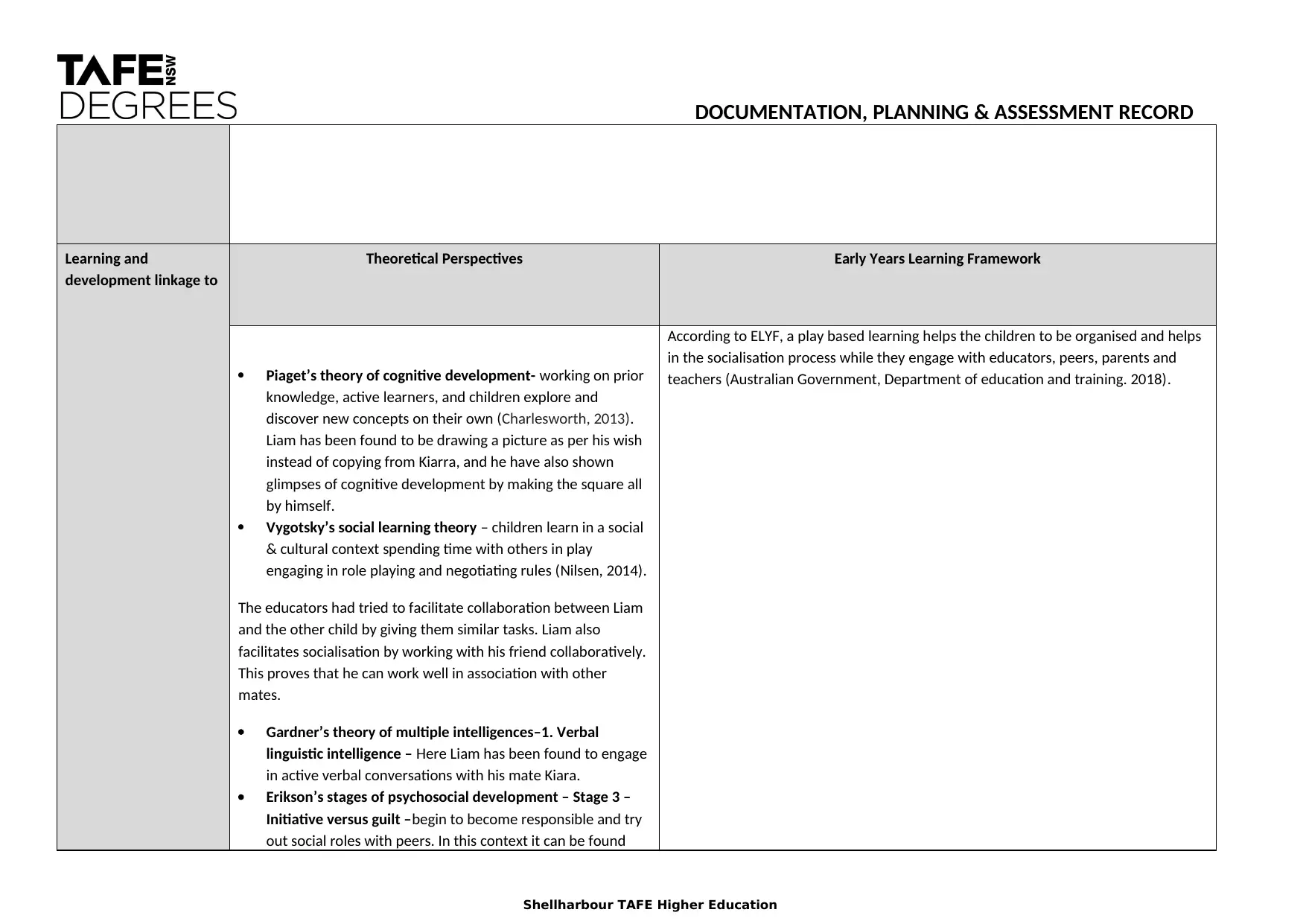
DOCUMENTATION, PLANNING & ASSESSMENT RECORD
Learning and
development linkage to
Theoretical Perspectives Early Years Learning Framework
Piaget’s theory of cognitive development- working on prior
knowledge, active learners, and children explore and
discover new concepts on their own (Charlesworth, 2013).
Liam has been found to be drawing a picture as per his wish
instead of copying from Kiarra, and he have also shown
glimpses of cognitive development by making the square all
by himself.
Vygotsky’s social learning theory – children learn in a social
& cultural context spending time with others in play
engaging in role playing and negotiating rules (Nilsen, 2014).
The educators had tried to facilitate collaboration between Liam
and the other child by giving them similar tasks. Liam also
facilitates socialisation by working with his friend collaboratively.
This proves that he can work well in association with other
mates.
Gardner’s theory of multiple intelligences–1. Verbal
linguistic intelligence – Here Liam has been found to engage
in active verbal conversations with his mate Kiara.
Erikson’s stages of psychosocial development – Stage 3 –
Initiative versus guilt –begin to become responsible and try
out social roles with peers. In this context it can be found
According to ELYF, a play based learning helps the children to be organised and helps
in the socialisation process while they engage with educators, peers, parents and
teachers (Australian Government, Department of education and training. 2018).
Shellharbour TAFE Higher Education
Learning and
development linkage to
Theoretical Perspectives Early Years Learning Framework
Piaget’s theory of cognitive development- working on prior
knowledge, active learners, and children explore and
discover new concepts on their own (Charlesworth, 2013).
Liam has been found to be drawing a picture as per his wish
instead of copying from Kiarra, and he have also shown
glimpses of cognitive development by making the square all
by himself.
Vygotsky’s social learning theory – children learn in a social
& cultural context spending time with others in play
engaging in role playing and negotiating rules (Nilsen, 2014).
The educators had tried to facilitate collaboration between Liam
and the other child by giving them similar tasks. Liam also
facilitates socialisation by working with his friend collaboratively.
This proves that he can work well in association with other
mates.
Gardner’s theory of multiple intelligences–1. Verbal
linguistic intelligence – Here Liam has been found to engage
in active verbal conversations with his mate Kiara.
Erikson’s stages of psychosocial development – Stage 3 –
Initiative versus guilt –begin to become responsible and try
out social roles with peers. In this context it can be found
According to ELYF, a play based learning helps the children to be organised and helps
in the socialisation process while they engage with educators, peers, parents and
teachers (Australian Government, Department of education and training. 2018).
Shellharbour TAFE Higher Education
Paraphrase This Document
Need a fresh take? Get an instant paraphrase of this document with our AI Paraphraser
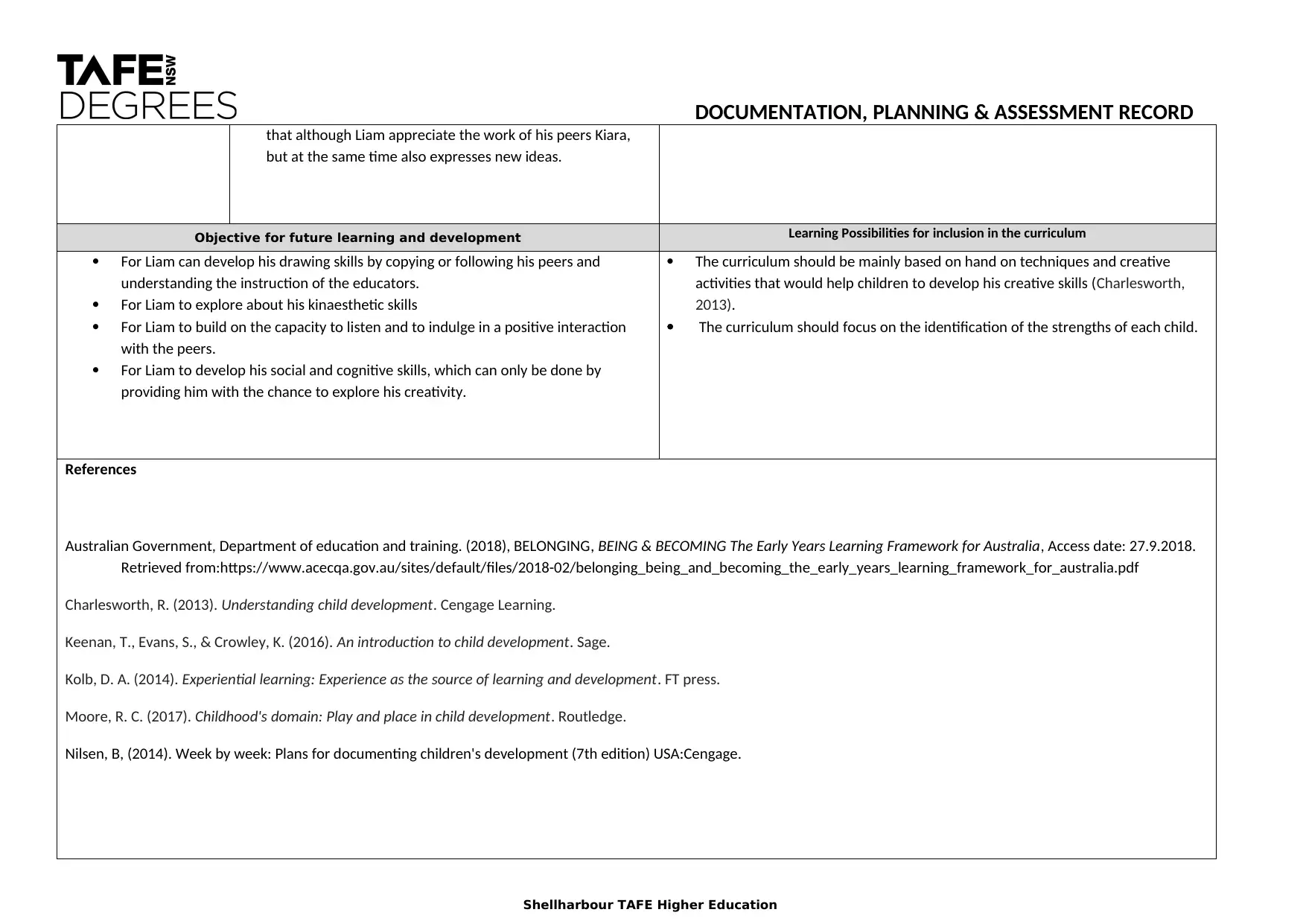
DOCUMENTATION, PLANNING & ASSESSMENT RECORD
that although Liam appreciate the work of his peers Kiara,
but at the same time also expresses new ideas.
Objective for future learning and development Learning Possibilities for inclusion in the curriculum
For Liam can develop his drawing skills by copying or following his peers and
understanding the instruction of the educators.
For Liam to explore about his kinaesthetic skills
For Liam to build on the capacity to listen and to indulge in a positive interaction
with the peers.
For Liam to develop his social and cognitive skills, which can only be done by
providing him with the chance to explore his creativity.
The curriculum should be mainly based on hand on techniques and creative
activities that would help children to develop his creative skills (Charlesworth,
2013).
The curriculum should focus on the identification of the strengths of each child.
References
Australian Government, Department of education and training. (2018), BELONGING, BEING & BECOMING The Early Years Learning Framework for Australia, Access date: 27.9.2018.
Retrieved from:https://www.acecqa.gov.au/sites/default/files/2018-02/belonging_being_and_becoming_the_early_years_learning_framework_for_australia.pdf
Charlesworth, R. (2013). Understanding child development. Cengage Learning.
Keenan, T., Evans, S., & Crowley, K. (2016). An introduction to child development. Sage.
Kolb, D. A. (2014). Experiential learning: Experience as the source of learning and development. FT press.
Moore, R. C. (2017). Childhood's domain: Play and place in child development. Routledge.
Nilsen, B, (2014). Week by week: Plans for documenting children's development (7th edition) USA:Cengage.
Shellharbour TAFE Higher Education
that although Liam appreciate the work of his peers Kiara,
but at the same time also expresses new ideas.
Objective for future learning and development Learning Possibilities for inclusion in the curriculum
For Liam can develop his drawing skills by copying or following his peers and
understanding the instruction of the educators.
For Liam to explore about his kinaesthetic skills
For Liam to build on the capacity to listen and to indulge in a positive interaction
with the peers.
For Liam to develop his social and cognitive skills, which can only be done by
providing him with the chance to explore his creativity.
The curriculum should be mainly based on hand on techniques and creative
activities that would help children to develop his creative skills (Charlesworth,
2013).
The curriculum should focus on the identification of the strengths of each child.
References
Australian Government, Department of education and training. (2018), BELONGING, BEING & BECOMING The Early Years Learning Framework for Australia, Access date: 27.9.2018.
Retrieved from:https://www.acecqa.gov.au/sites/default/files/2018-02/belonging_being_and_becoming_the_early_years_learning_framework_for_australia.pdf
Charlesworth, R. (2013). Understanding child development. Cengage Learning.
Keenan, T., Evans, S., & Crowley, K. (2016). An introduction to child development. Sage.
Kolb, D. A. (2014). Experiential learning: Experience as the source of learning and development. FT press.
Moore, R. C. (2017). Childhood's domain: Play and place in child development. Routledge.
Nilsen, B, (2014). Week by week: Plans for documenting children's development (7th edition) USA:Cengage.
Shellharbour TAFE Higher Education
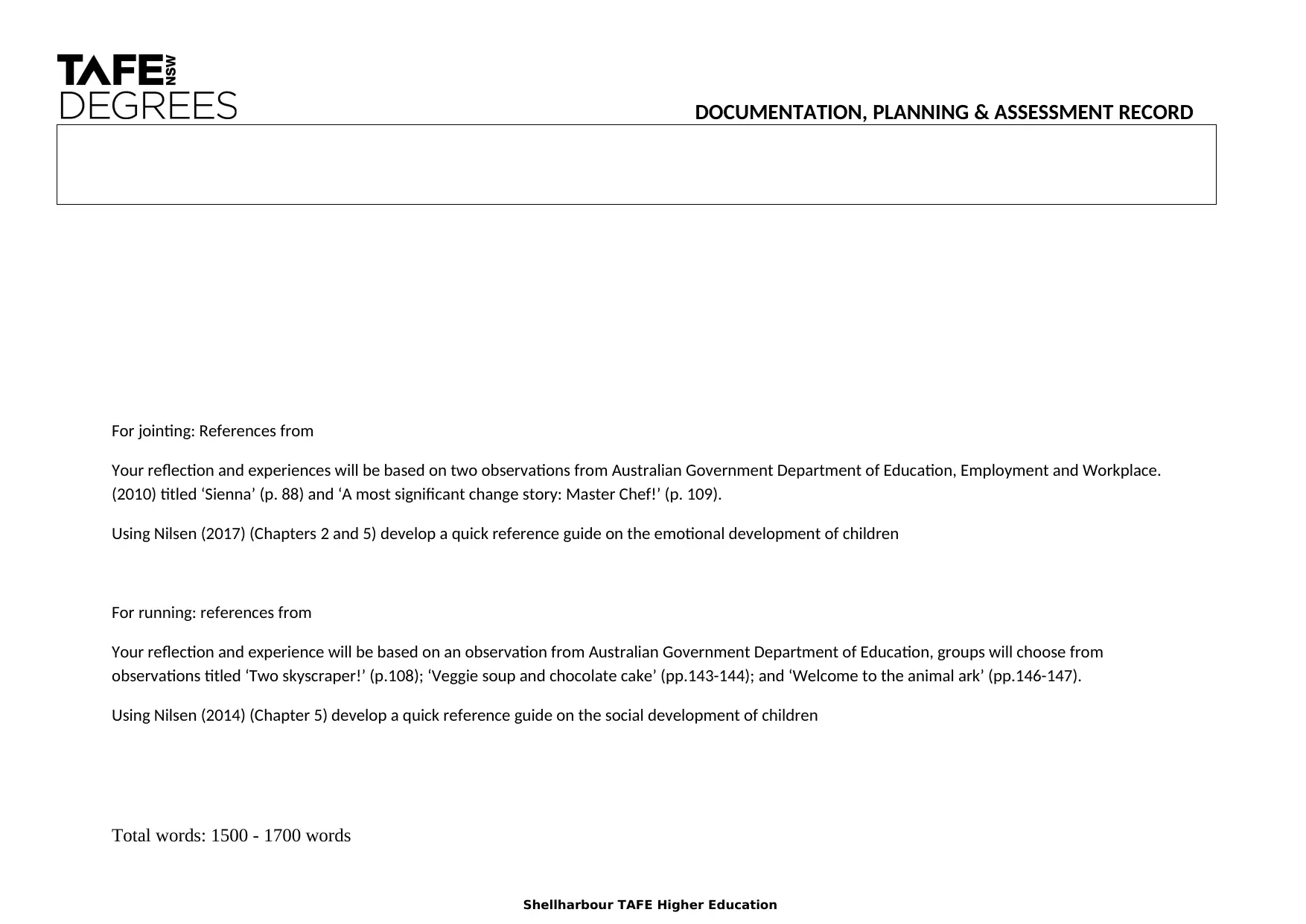
DOCUMENTATION, PLANNING & ASSESSMENT RECORD
For jointing: References from
Your reflection and experiences will be based on two observations from Australian Government Department of Education, Employment and Workplace.
(2010) titled ‘Sienna’ (p. 88) and ‘A most significant change story: Master Chef!’ (p. 109).
Using Nilsen (2017) (Chapters 2 and 5) develop a quick reference guide on the emotional development of children
For running: references from
Your reflection and experience will be based on an observation from Australian Government Department of Education, groups will choose from
observations titled ‘Two skyscraper!’ (p.108); ‘Veggie soup and chocolate cake’ (pp.143-144); and ‘Welcome to the animal ark’ (pp.146-147).
Using Nilsen (2014) (Chapter 5) develop a quick reference guide on the social development of children
Total words: 1500 - 1700 words
Shellharbour TAFE Higher Education
For jointing: References from
Your reflection and experiences will be based on two observations from Australian Government Department of Education, Employment and Workplace.
(2010) titled ‘Sienna’ (p. 88) and ‘A most significant change story: Master Chef!’ (p. 109).
Using Nilsen (2017) (Chapters 2 and 5) develop a quick reference guide on the emotional development of children
For running: references from
Your reflection and experience will be based on an observation from Australian Government Department of Education, groups will choose from
observations titled ‘Two skyscraper!’ (p.108); ‘Veggie soup and chocolate cake’ (pp.143-144); and ‘Welcome to the animal ark’ (pp.146-147).
Using Nilsen (2014) (Chapter 5) develop a quick reference guide on the social development of children
Total words: 1500 - 1700 words
Shellharbour TAFE Higher Education
⊘ This is a preview!⊘
Do you want full access?
Subscribe today to unlock all pages.

Trusted by 1+ million students worldwide
1 out of 9
Related Documents
Your All-in-One AI-Powered Toolkit for Academic Success.
+13062052269
info@desklib.com
Available 24*7 on WhatsApp / Email
![[object Object]](/_next/static/media/star-bottom.7253800d.svg)
Unlock your academic potential
Copyright © 2020–2026 A2Z Services. All Rights Reserved. Developed and managed by ZUCOL.





